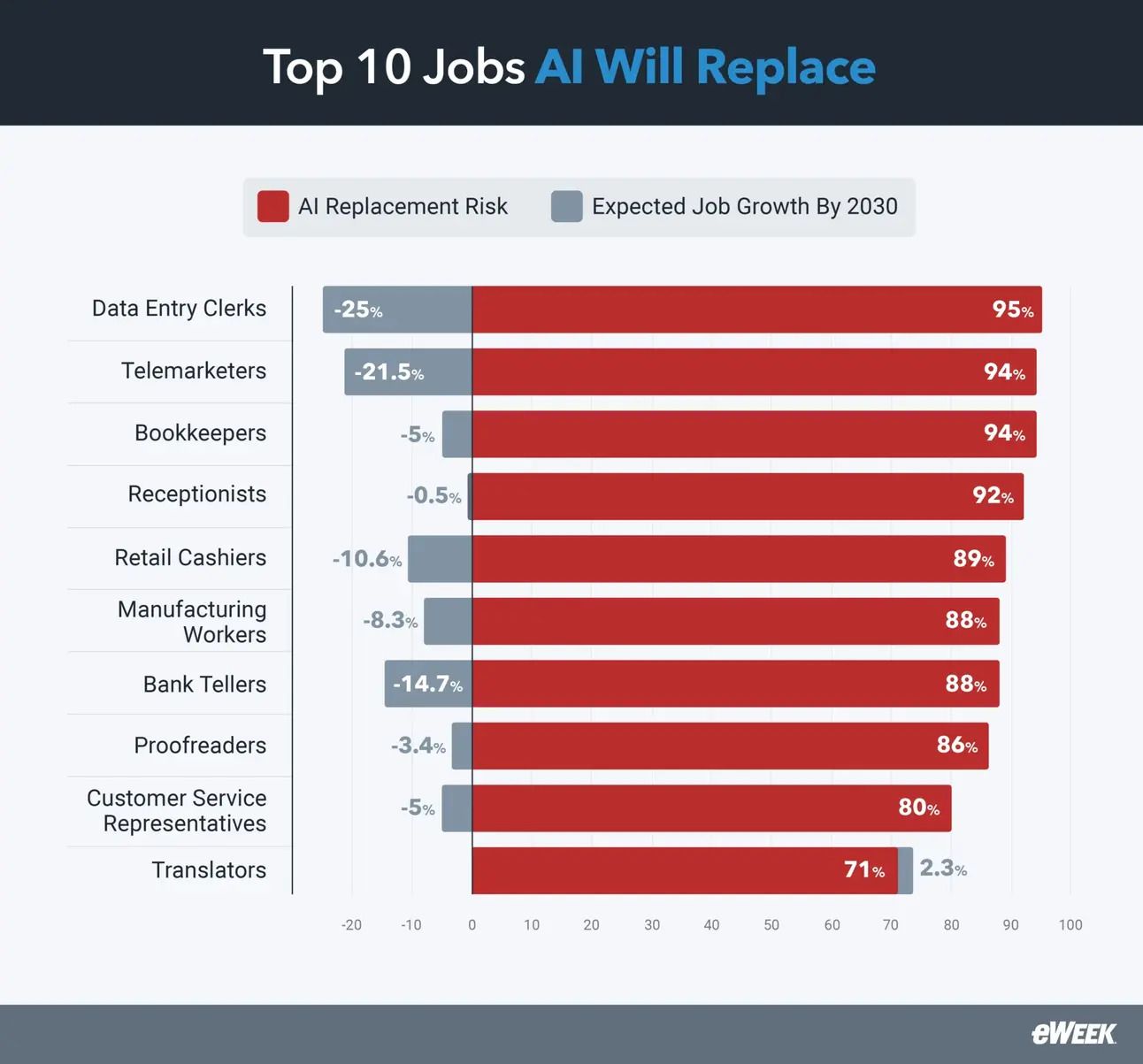- Jacob Kowalski
- Posts
- Your First Job Just Got Replaced
Your First Job Just Got Replaced
How AI is Shutting Out Entry-Level Workers
Who am I?
Hello and welcome to the first article in the AI Knowledge Hub! 🙋♂️
My name is Jacob Kowalski and I am really into AI stuff for some time now.
Now I am creating with AI many really cool things like: chatbots, AI assistants, automations, agents, etc. 🤖
I think we are living in a the biggest revolution of our generation and want to share my thoughts about it. Maybe for some of you they will be interesting or maybe you want to share your take on this too.
If you want to know more about me and what I am doing, checkout my page with button below. 👇
Fear spreading first article.
This one was created mainly because I have found some eye-catching articles about entry-level jobs replacements by AI and I have found it very interesting and little scary. 😨
I have gathered some more data and prepared a longer article that recaps most important takes on that topic.
I apologize in advance for all the negative information contained in this text, but the topic is serious enough that it's worth being made aware of how AI is changing our working reality from day to day.
Nonetheless, I have tried to include a trace of positivity and possible developments that, in the whole situation, will allow us not only to survive but to take advantage of the opportunities that arise during this revolution. 🚀
Introduction
It's hardly groundbreaking to say that AI is becoming a revolution on the scale of the internet.
From initial curious conversations with a "cyber-human," through a quick way to write essays, ChatGPT and other models have become tools that have redefined most aspects of our private and (mainly) professional lives.
Each of us has certainly dumped responsibilities on ChatGPT multiple times - writing essays, emails or reports, looking for a personal trainer, dietitian, or even a psychologist - with mostly positive results.
AI in its essence is something we've never dealt with before. We can ask it for almost anything related to operating in the digital world, and it's able to do it.
With the development of models, these are increasingly difficult tasks. Sure, ChatGPT won't wash your dishes, but it will help you buy the best dishwasher. It won't go to the gym for you, but it will prepare a professional workout plan and diet.
The growing scale of AI's possibilities and applications is causing an explosion of enthusiasm and euphoria. More and more people are bragging about what AI has created for them - and this isn't limited to just private successes.
Everywhere you look, companies are celebrating their AI victories - automating processes, cutting costs, and proudly announcing their digital transformations. AI is at its peak, seamlessly assisting us in every aspect of private and business life.
But while everyone is toasting their gains, there's a darker reality unfolding: the entry-level jobs that once launched careers are vanishing, replaced by the same algorithms that help us with our mundane tasks.
Slowly, an entire generation of fresh graduates is discovering that their first step into the professional world has been automated away.
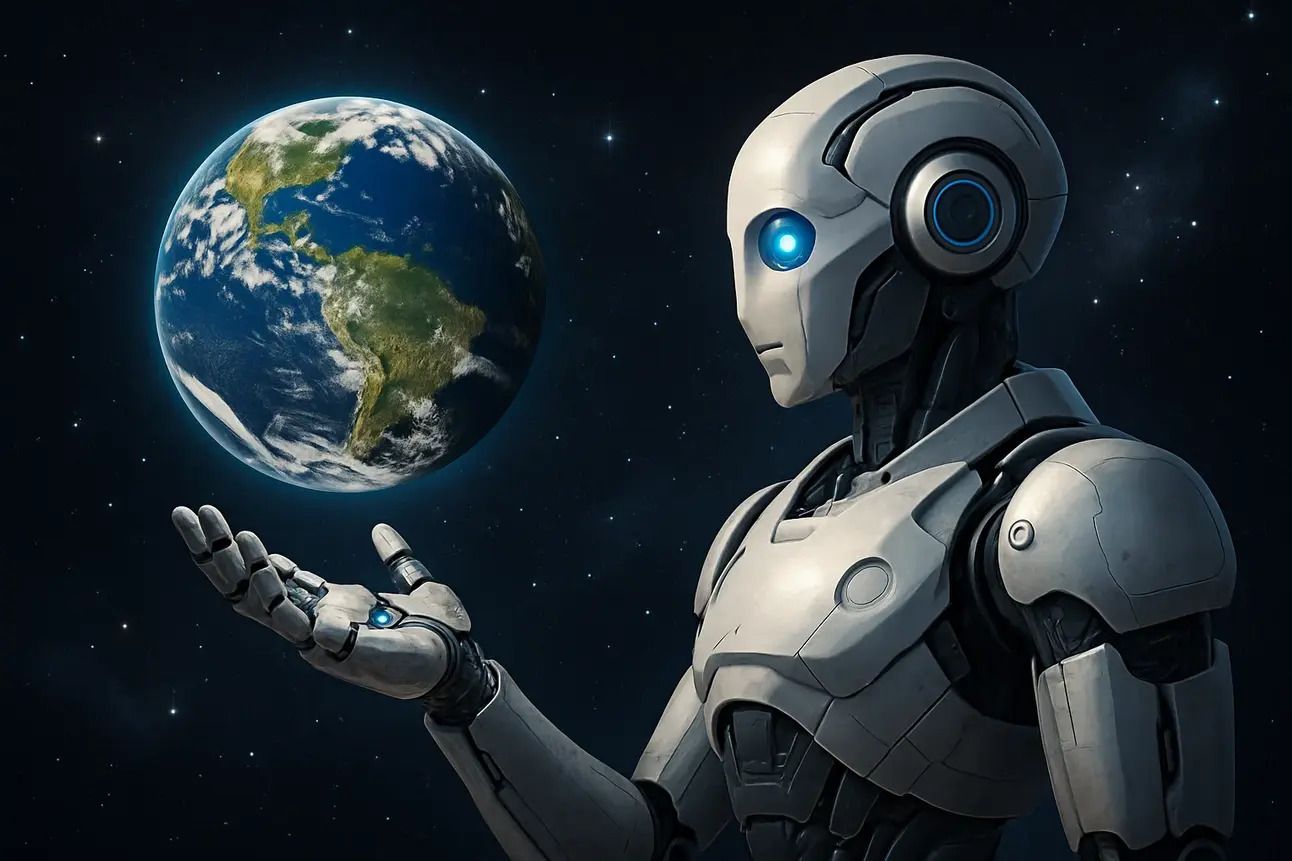
The Automation Hit List: Which Entry-Level Jobs Are Disappearing First
Of course, not every type of work will be replaceable by AI. Artificial intelligence (yet) won't take care of your children, clean the office, fix the sink, or build an apartment.
The chart above shows the top 10 jobs with the highest risk of AI replacement. Most, if not all, are jobs that mainly involve tedious, repetitive tasks - exactly what AI was created for.
If the mentioned group of workers doesn't apply to you, that doesn't mean you're irreplaceable.
AI is developing at a pace that defies human understanding.
No one would have thought that within a few years of that goofy chat we wrote to out of boredom, AI would be able to independently program applications using simple prompts.
In reality, everyone is threatened, especially computer-related jobs like web designers, graphic designers, video editors, photographers.
No one is safe in the approaching AI era.
Just as during previous industrial revolutions, machines replaced humans in physical activities, this revolution focuses more on white-collar workers - stereotypical office employees working primarily with their minds rather than muscle power (though not exclusively, as AI will be able to expand the range of machines capable of performing even more tasks for humans).
This isn't an overnight change, but rather a slow reduction of the workforce that deals mainly with repetitive, simple tasks that don't require extensive knowledge or experience. That's right - this sounds like every entry-level job.
These workers are most threatened by competition from AI. The career ladder you need to climb to advance in your career now looks as if someone removed the first few rungs.
This doesn't necessarily mean layoffs (although those occur too), but an increasing number of rejected applications, fewer job postings, and reduced salary budgets for employees.
There are many ways, but the effect remains the same: increasing difficulty for people fresh out of college to find work.
The Skills Gap Paradox: When 'Entry-Level' Requires 5 Years Experience
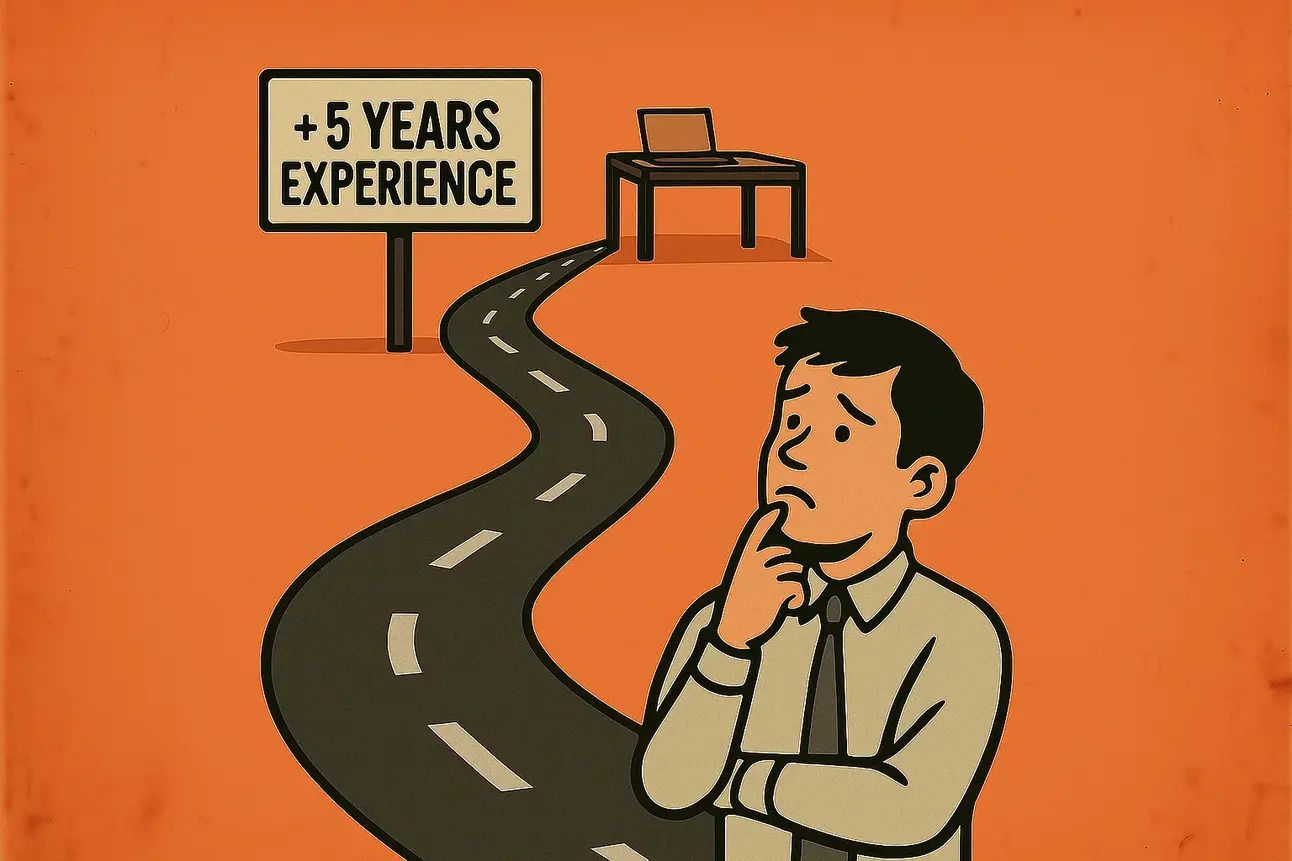
Companies implementing AI to handle simple processes are fundamentally changing the structure of the job market.
People without experience are ceasing to have any value. Why hire someone who needs to spend a year or six months on training when AI can do it faster and cheaper?
On the other hand, companies are increasingly eager to acquire experienced people from the market who:
(a) understand the processes operating in a given industry,
(b) possess knowledge, experience, and connections, and
(c) will be able to use AI systems in the most efficient way possible.
All of this leads to a certain paradox where entry-level jobs will require candidates to have years of experience performing these tasks.
Moreover, possession of a range of soft skills will be required - something that will be added value that AI cannot, at least for now, provide.
The creation of this vicious cycle will deepen problems in countries where youth unemployment rate is already at a high level (see Spain/Greece) and in places that are outsourcing centers for simple activities (see India).
Most Important Part!
Numbers Don't Lie: The Statistical Reality of Unemployment in the AI Era
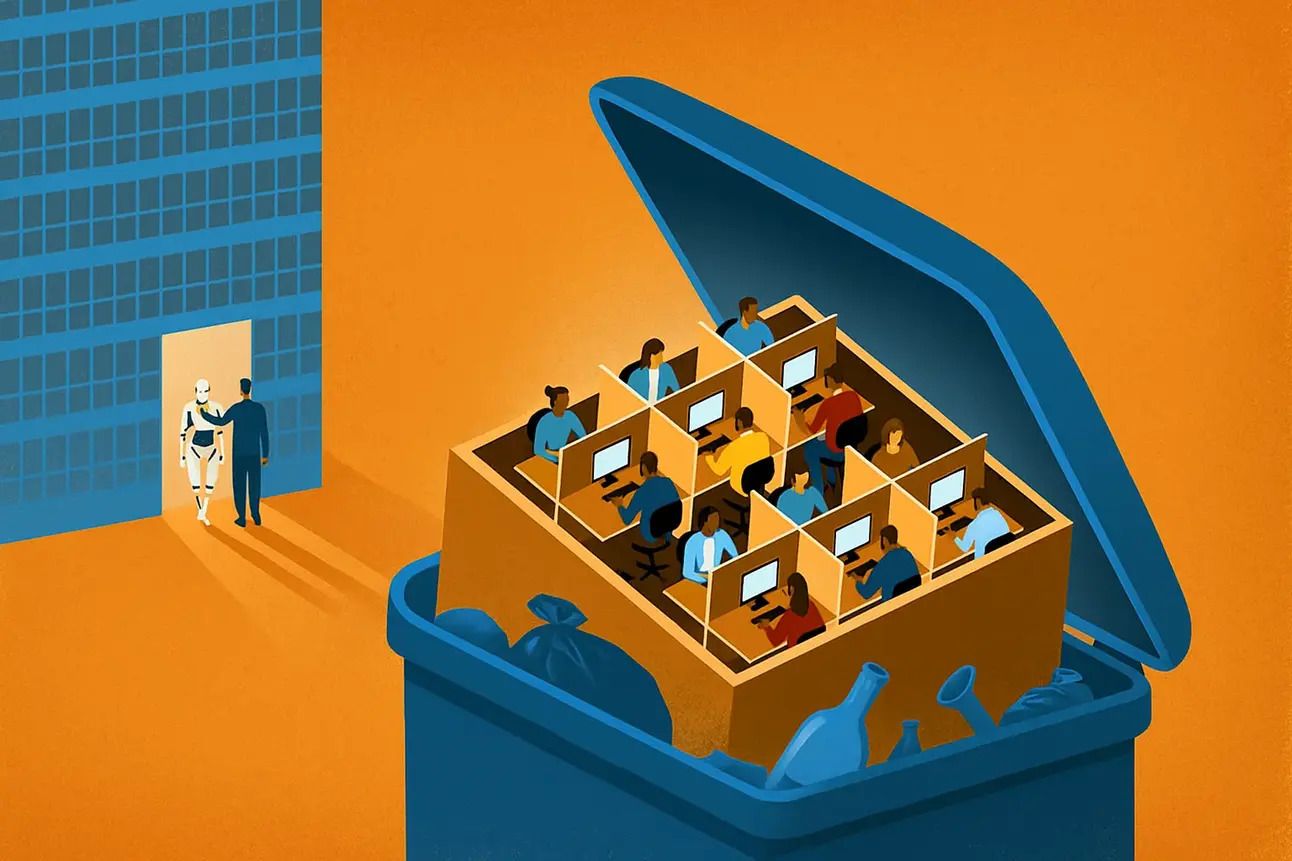
AI has been the number one topic for some time now. Most often it's presented as something that will bring us only benefits - it will help us with boring tasks, advise us on running shoes, plan vacations, and automate a series of activities that would take us a lot of time.
Unfortunately, the negative side is rarely discussed.
The information noise related to AI is so large that it's very difficult to find reliable information.
Even regarding threats from AI, content mainly aims to evoke fear and resistance to AI implementation, instead of presenting a complete and substantive picture of the situation.
And the situation itself, looking at numerical data, doesn't look positive from the perspective of both people entering the job market and those performing relatively simple jobs.
While we may hear from many tech giants that AI is supposed to support and facilitate our work, the numbers speak for themselves:
Microsoft: 6,000 layoffs in May 2025, with software engineers making up over 40% of cuts
IBM: 8,000 recent layoffs concentrated in HR, plus 9,000 more planned
Meta: 5% workforce reduction targeting "lowest-performing" staff
Amazon: Cutting 100 roles in Devices division
This wave of layoffs feels different. Companies aren't just cutting costs anymore - they're replacing entire job functions with software.
According to Goldman Sachs, AI could replace the equivalent of 300 million full-time jobs.
While experts agree that customer service jobs will be augmented and automated but not replaced, let's consider why keep an employee whose tasks are 90% performed by AI.
Sure, AI might not replace entire teams, but if it can perform most tasks, suddenly a team of 20 consultants might become a team with 3 people that, instead of focusing on repetitive tasks, will operate and manage AI systems, the rest 17 are out of work.
According to SEO.AI, AI could potentially replace around 800 million jobs worldwide by 2030.
Job losses are expected in various sectors, with automation replacing basic roles. Workers in manufacturing, retail, and customer service industries are particularly vulnerable.
As AI takes over repetitive tasks, workforce shifts may cause disruptions and lead to retraining requirements for displaced workers.
A World Economic Forum predicts that, over 90 million jobs will be replaced by AI. Over 40% of companies assume they'll reduce their workforce when AI becomes capable of performing analogous work.
Interestingly, it's not only simple professions that are threatened with replaceability.
Technology sector workers are equally at risk. The job of a programmer, once a symbol of stable and high wages, is becoming just as exposed to risk as that of an administrative clerk.
Below is a chart from showing the scale of layoffs in the technology industry over the past few months.
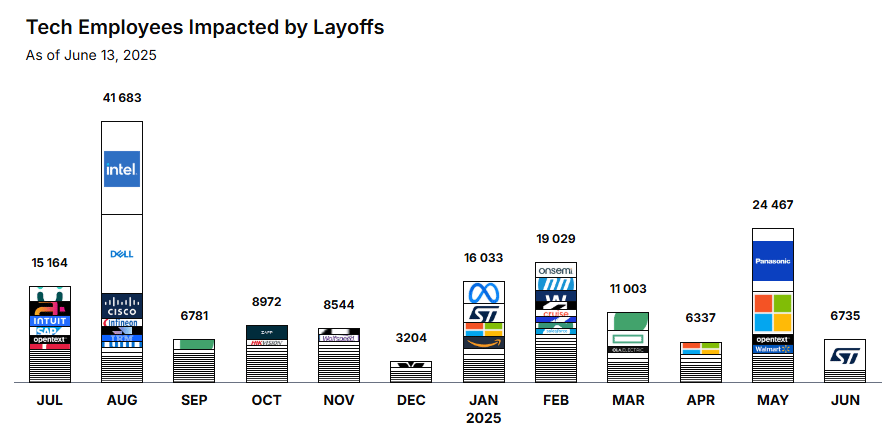
source: trueup.io - https://www.trueup.io/layoffs
Below are some of the most important statistics illustrating the state we find ourselves in today:
14% of workers claim to have already lost a job to ‘robots’.
In May 2023, 3,900 US job losses were linked directly to AI.
British Telecom aims to replace 10,000 staff with AI within 7 years.
Early AI and automation have already driven down wages by up to 70% since 1980.
30% of workers fear their job will soon be replaced by technology.
More than half of 18 to 24-year-olds are concerned about AI taking jobs.
81.6% of digital marketers believe content writers will lose jobs because of AI.
CEOs of AI firms like OpenAI have signed an open letter warning about the risk of extinction from AI.
The spark of positivity!
Fighting Back: Strategies for Surviving and Thriving in the AI Job Revolution
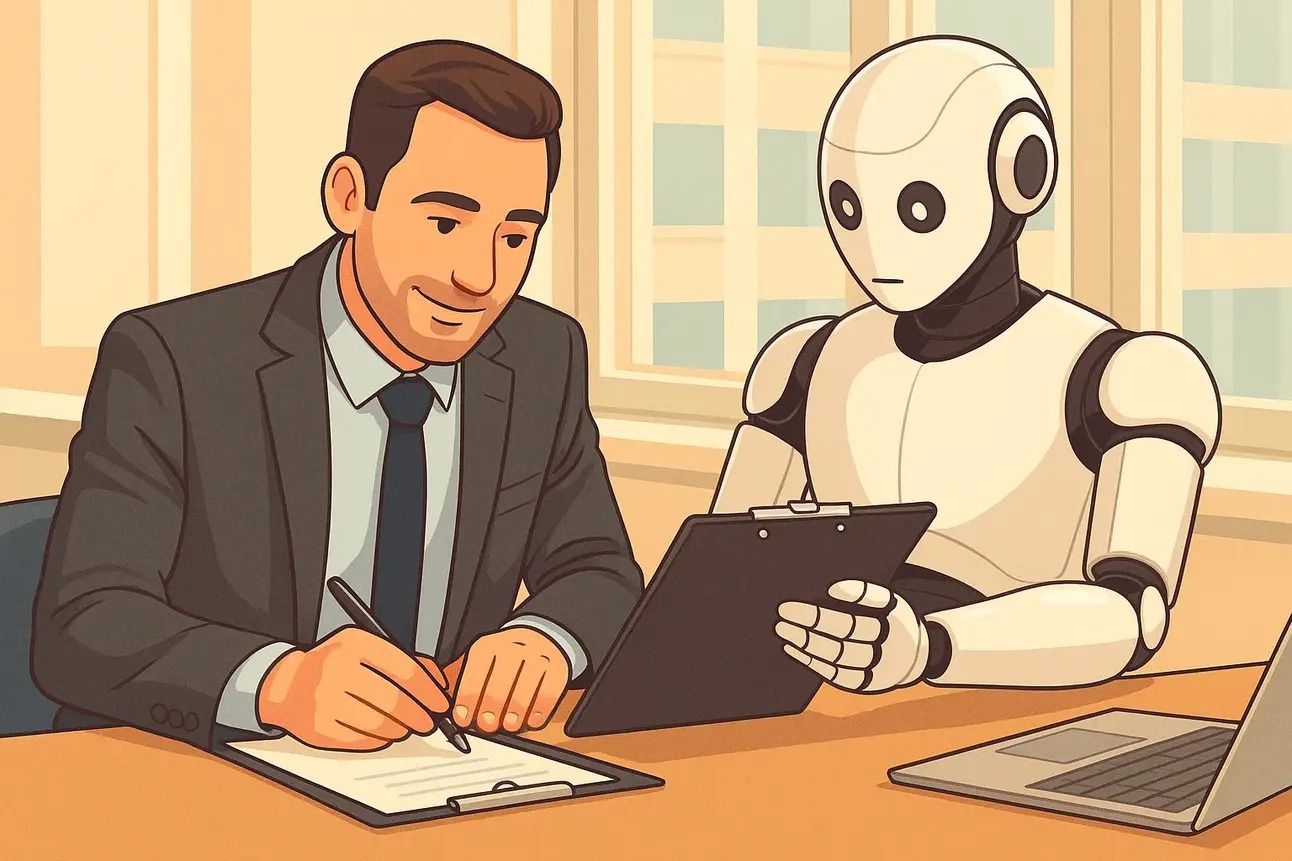
Shrinking demand for jobs for young people will, in the long term, cause a shortage of experienced specialists as well.
After all, every specialist started as an intern gaining years of experience while performing simple and repetitive tasks.
All of this may cause a domino effect that will once again revolutionize the job market.
The current generation Z has never encountered the problem of unemployment (at least in developed countries).
Of course, they weren't always able to find their dream job, but generally speaking, they had no problem finding work that was at least close to their interests.
With young workers being displaced by AI, so-called technological unemployment may return to the discussion - a situation where people lose jobs due to technology replacing them.
Such situations have occurred many times before, and as we well know, history likes to repeat itself.
Okay, enough panic-spreading. 🛑
AI indeed brings many threats that we'll have to face, but not everything is doom and gloom. Despite the fact that many professions will disappear because of (or thanks to) AI, a significant portion will also appear in their place.
Every new technology brings many opportunities and challenges, and what's most important in such situations is the ability to adapt.
There are no evergreen hard skills that will help you get through all revolutions with dry feet.
Previously it was the ability to communicate with chat (prompting); currently, the most sought-after skill is creating AI Agents; tomorrow it might be something else entirely.
Although public education is a little behind (and it will be, I presume), you have access to free resources like YouTube videos, online courses, or community platforms where we can build and enhance our AI knowledge and competitiveness.
Embracing adaptability and a lifelong learning approach will give you a significant advantage, opening doors to high-level, rewarding roles in the future.
Sources
The sources I’ve used to create this article are:
https://www.techtarget.com/whatis/feature/Will-AI-replace-jobs-9-job-types-that-might-be-affected
https://www.technologyreview.com/2024/01/27/1087041/technological-unemployment-elon-musk-jobs-ai/
https://www.eweek.com/artificial-intelligence/jobs-ai-will-replace/
https://dialzara.com/blog/ai-in-customer-service-impact-on-jobs-2024/
https://blog.hubspot.com/service/rethinking-customer-service-jobs
https://www.linkedin.com/pulse/report-data-entry-jobs-risk-being-replaced-ai-brandon-cornett/
https://www.washingtonpost.com/technology/2023/10/03/ai-customer-service-jobs/
https://www.weforum.org/stories/2025/04/ai-jobs-international-workers-day/
and of course:
Chat GPT, Claude AI 😊
